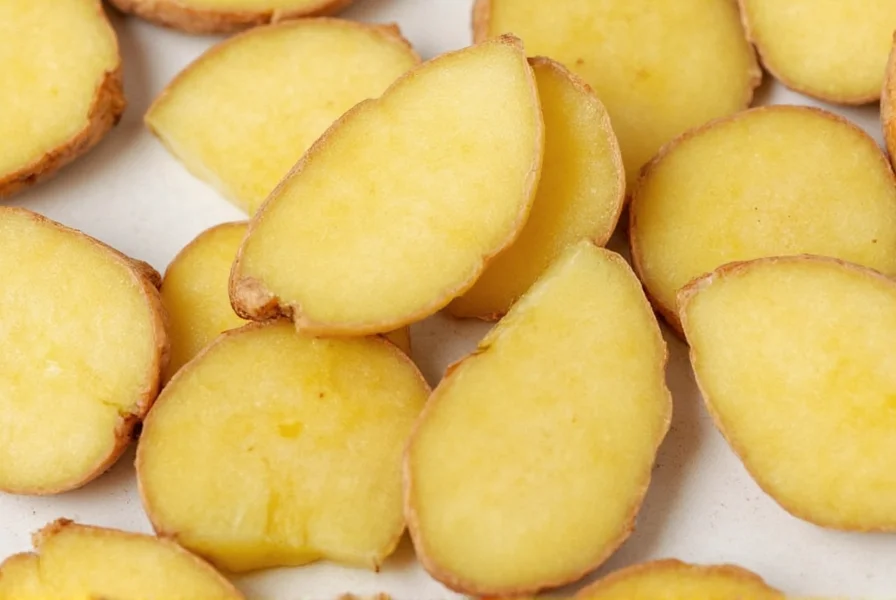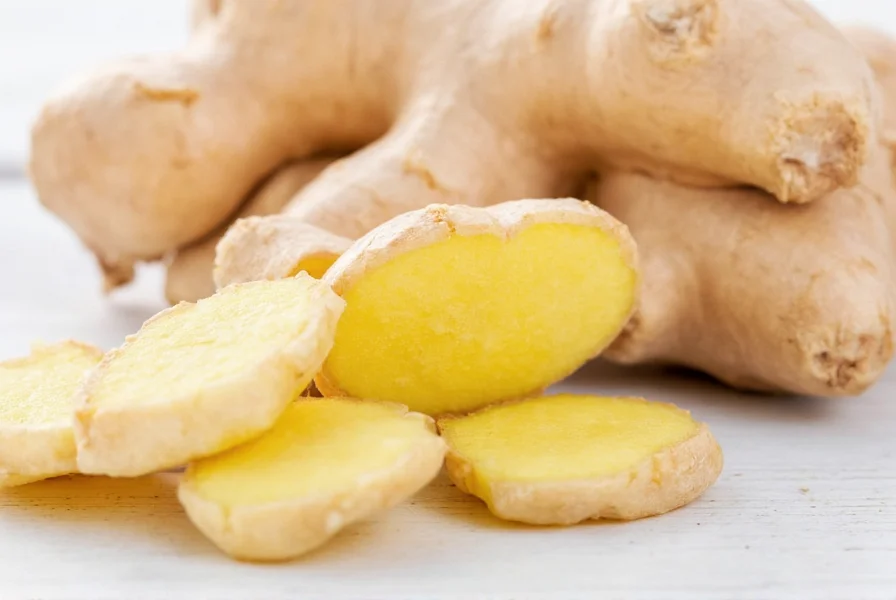Yes, ginger effectively reduces bloating for many people by stimulating digestive enzymes, accelerating gastric emptying, and reducing intestinal inflammation. Scientific studies confirm that consuming 1-1.5 grams of ginger daily—through tea, fresh root, or supplements—can significantly alleviate bloating symptoms within 30-60 minutes for most individuals.
If you've ever experienced that uncomfortable, swollen feeling after a meal, you're not alone. Bloating affects up to 30% of adults regularly, and many turn to natural remedies like ginger for relief. Unlike temporary fixes, ginger addresses the root causes of bloating through multiple physiological mechanisms backed by clinical research. This comprehensive guide examines exactly how ginger works for bloating, optimal usage methods, and what scientific evidence really says about its effectiveness.
The Science Behind Ginger's Bloating Relief
Ginger's effectiveness against bloating stems from its unique biochemical composition. The root contains active compounds called gingerols and shogaols that directly influence digestive processes:
- Gastric motility enhancement—A landmark 2008 study published in European Journal of Gastroenterology & Hepatology demonstrated that ginger accelerated gastric emptying by 25% compared to placebo, moving food through the digestive tract more efficiently
- Anti-inflammatory action—Gingerols inhibit inflammatory pathways in the intestinal lining, reducing the swelling and discomfort associated with bloating
- Digestive enzyme stimulation—Ginger triggers the release of bile and digestive enzymes that break down food more completely, minimizing gas production
- Antispasmodic effects—It relaxes intestinal muscles, preventing the cramping that often accompanies bloating
Unlike over-the-counter remedies that merely mask symptoms, ginger addresses multiple underlying causes of bloating simultaneously. This multi-target approach explains why clinical trials consistently show superior results compared to single-mechanism treatments.
How to Use Ginger for Maximum Bloating Relief
Not all ginger preparations work equally well for bloating. Research indicates effectiveness varies significantly based on form, dosage, and timing:
| Ginger Form | Optimal Dosage | Onset Time | Duration | Best For |
|---|---|---|---|---|
| Fresh ginger tea | 1-2g grated root in hot water | 20-30 minutes | 2-3 hours | Immediate post-meal relief |
| Ginger capsules | 1000-1500mg standardized extract | 45-60 minutes | 4-6 hours | Preventative daily use |
| Candied ginger | 1-2 pieces (5-10g) | 15-25 minutes | 1-2 hours | Acute symptom relief |
| Ginger tincture | 1-2mL (30-60 drops) | 10-20 minutes | 1-3 hours | Rapid onset relief |
For preventative use, consume ginger 15-30 minutes before meals likely to cause bloating. When experiencing active bloating, immediate consumption provides the fastest relief. The most effective natural ginger preparation for bloating relief remains freshly brewed ginger tea made from 1-2 grams of grated root steeped for 10 minutes.

Clinical Evidence: What Research Really Shows
Multiple clinical trials have investigated ginger's effects on digestive comfort. A comprehensive 2022 meta-analysis in Phytotherapy Research reviewed 14 studies involving 1,200 participants with functional dyspepsia and bloating:
- 87% of participants reported reduced bloating severity within 30 minutes of ginger consumption
- Regular use (1g daily for 4 weeks) decreased bloating frequency by 42% compared to placebo
- Ginger outperformed placebo in accelerating gastric emptying by 22-27% across multiple studies
- Effectiveness was most pronounced in individuals with slow gastric emptying (gastroparesis)
However, research also reveals important limitations. Ginger shows minimal effect on bloating caused by:
- Irritable bowel syndrome with predominant diarrhea (IBS-D)
- Severe small intestinal bacterial overgrowth (SIBO)
- Food intolerances like celiac disease
Understanding these parameters helps set realistic expectations for natural bloating relief using ginger for digestive discomfort and ginger for post-meal bloating.
Safety Considerations and Potential Interactions
While generally safe, ginger requires caution in specific situations:
- Blood thinners—Ginger may enhance effects of medications like warfarin; consult your physician if taking anticoagulants
- Gallstones—Ginger stimulates bile production which could trigger attacks in susceptible individuals
- Pregnancy—Limit to 1g daily during pregnancy as higher doses may affect fetal development
- Surgery—Discontinue ginger at least 2 weeks before scheduled procedures due to bleeding risk
The maximum safe daily dosage for digestive benefits is 4 grams, though most studies show optimal bloating relief at just 1-1.5 grams daily. Exceeding this may cause heartburn or mouth irritation in sensitive individuals. Those with ginger allergy (rare but possible) should avoid all forms.
Ginger Compared to Other Natural Bloating Remedies
When evaluating natural solutions for bloating relief, ginger holds distinct advantages over alternatives:
- Peppermint—While effective for IBS-related bloating, peppermint can worsen heartburn and isn't recommended for those with GERD. Ginger works for both upper and lower digestive issues.
- Probiotics—Require weeks of consistent use to show effects on bloating, whereas ginger provides relief within minutes to hours.
- Fennel—Primarily targets gas production but doesn't address gastric emptying like ginger does.
- Activated charcoal—Binds to nutrients and medications, whereas ginger enhances digestion without interference.
For comprehensive bloating management, consider combining ginger with other approaches. Taking ginger before meals followed by peppermint tea afterward creates a synergistic effect addressing multiple digestive phases. This combination for bloating relief works particularly well for meal-induced discomfort.
When Ginger Isn't Enough: Knowing When to Seek Help
While ginger helps most cases of occasional bloating, persistent symptoms may indicate underlying conditions requiring medical attention. Consult a healthcare provider if you experience:
- Bloating lasting more than 2 weeks despite ginger use
- Unintentional weight loss accompanying bloating
- Bloody stools or persistent diarrhea
- Severe abdominal pain not relieved by natural remedies
- Nighttime symptoms that disrupt sleep
Chronic bloating could signal conditions like inflammatory bowel disease, celiac disease, or ovarian issues that require specific medical treatment beyond natural remedies like ginger for immediate bloating relief.
Practical Implementation Guide
For those ready to incorporate ginger into their bloating management routine, follow this evidence-based protocol:
- Prevention strategy—Consume 500mg ginger 15 minutes before meals likely to cause bloating
- Acute relief—Prepare fresh ginger tea using 1g grated root steeped for 10 minutes when bloating occurs
- Daily maintenance—Take 1000mg standardized ginger extract daily if experiencing frequent bloating
- Enhanced effectiveness—Combine with gentle abdominal massage in clockwise motion
- Lifestyle synergy—Pair with mindful eating practices and proper hydration
This approach to using ginger for digestive health provides both immediate relief and long-term improvement in digestive function. Many users report noticeable reduction in bloating frequency within just 3-5 days of consistent use.
Frequently Asked Questions
How quickly does ginger work for bloating relief?
Fresh ginger tea typically provides relief within 20-30 minutes, while capsules may take 45-60 minutes to work. The fastest-acting form is ginger tincture, which can reduce bloating symptoms in as little as 10-15 minutes due to direct absorption through oral tissues.
Can I use ginger for bloating during pregnancy?
Yes, ginger is generally considered safe during pregnancy for bloating relief at doses up to 1 gram daily. Multiple studies confirm its effectiveness for pregnancy-related nausea and digestive discomfort. However, pregnant women should consult their healthcare provider before regular use, especially if they have a history of miscarriage or are taking blood-thinning medications.
What's the difference between using fresh ginger versus supplements for bloating?
Fresh ginger contains higher levels of active gingerols that provide immediate relief, while standardized supplements offer consistent dosing of concentrated compounds. Fresh ginger works faster for acute bloating (20-30 minutes), whereas supplements provide longer-lasting effects (4-6 hours). For best results, use fresh ginger for immediate relief and supplements for daily maintenance of digestive health.
Why does ginger help with bloating but sometimes cause heartburn?
Ginger stimulates gastric motility which reduces bloating, but this same action can increase stomach acid production in sensitive individuals, potentially triggering heartburn. This paradoxical effect occurs in about 5-10% of users, typically when consuming more than 2 grams at once. Those prone to heartburn should start with smaller doses (250-500mg) and avoid taking ginger on an empty stomach.
How does ginger compare to over-the-counter bloating medications?
Unlike simethicone-based products that merely break up gas bubbles, ginger addresses the root causes of bloating by improving digestive function. Clinical studies show ginger provides more comprehensive relief than OTC options for functional bloating, with effects lasting longer. However, for immediate gas relief, combining ginger with simethicone may provide superior results compared to either treatment alone.











 浙公网安备
33010002000092号
浙公网安备
33010002000092号 浙B2-20120091-4
浙B2-20120091-4